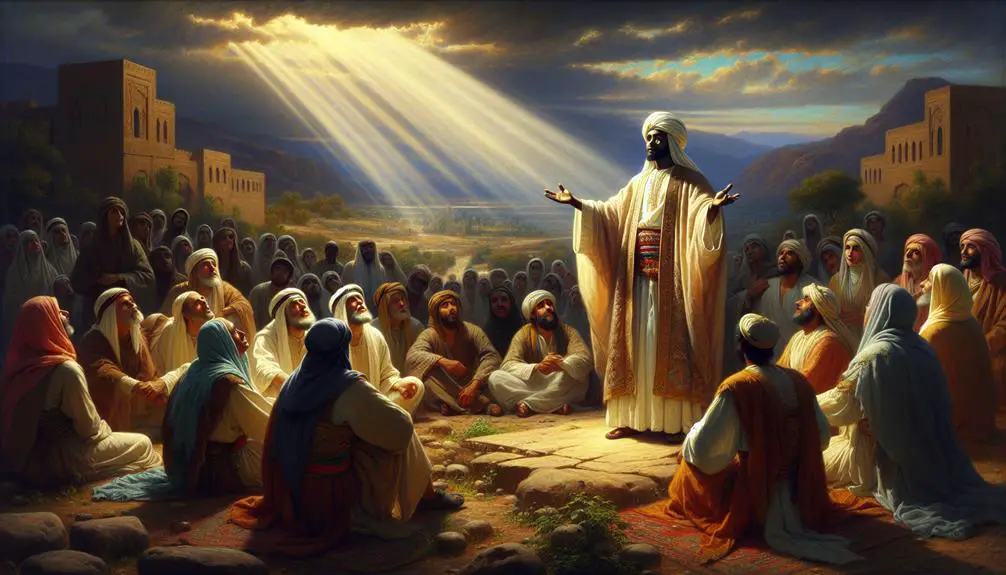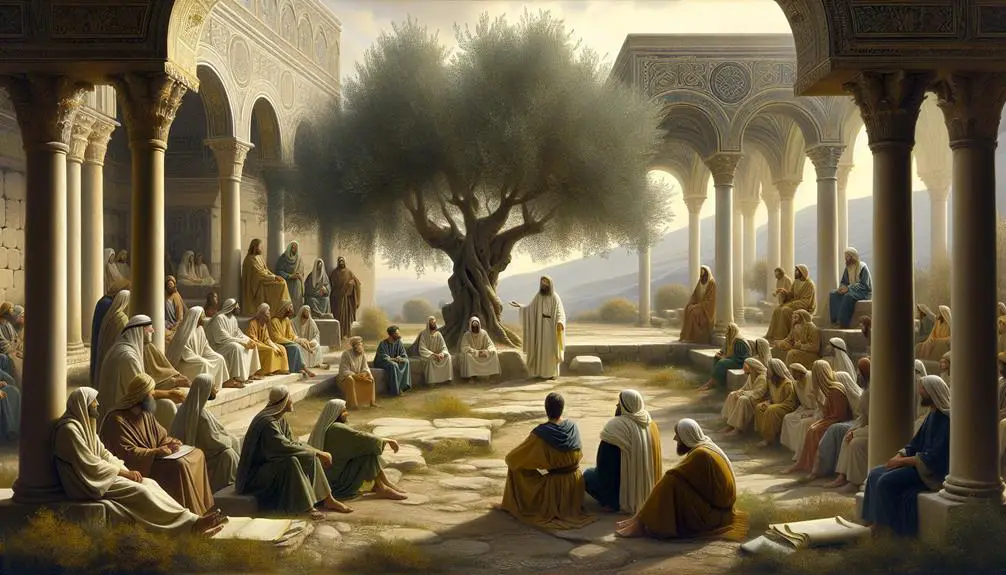Unveiling Agabus: an enigmatic prophet in the Bible whose predictions shaped early Christianity and tested the faith of many—discover his legacy.

Who Is Agabus in the Bible
You might not be familiar with Agabus, a lesser-known figure in the New Testament, whose role significantly impacted early Christianity.
As a prophet in the early church, Agabus's predictions, including a widespread famine and the imprisonment of the Apostle Paul, not only tested the faith of the early Christians but also guided their actions in times of crisis.
Exploring Agabus's story offers a unique lens through which to view the dynamics of prophecy and its effects on the nascent Christian community.
Let's uncover how his legacy continues to influence our understanding of faith, prophecy, and resilience in the face of adversity.
Key Takeaways
- Agabus was a Christian prophet known for accurate predictions, including a severe famine and Paul's imprisonment.
- His prophetic acts, rooted in early Christian tradition, served as moral and spiritual guidance for believers.
- Agabus's influence extended beyond his lifetime, impacting theological discussions and artistic representations of prophecy.
- His legacy illustrates the role of prophets in shaping the spiritual and moral landscape of early Christianity.
Agabus: A Brief Overview

Agabus stands as a significant yet enigmatic figure in early Christian tradition, known for his prophetic gifts as depicted in the Acts of the Apostles. Little is known about Agabus's origins, but his presence in the New Testament suggests he was part of the burgeoning Christian community in the first century. His prophetic methods, while not extensively detailed, offer insight into the practices of early Christian prophets.
You'll find that Agabus's approach to prophecy was both dramatic and symbolic, setting him apart from other figures of his time. For instance, his prediction of a severe famine across the Roman world, as recorded in Acts 11:28, was delivered without ambiguity, emphasizing his conviction and the seriousness with which his prophecies were received. This event showcases his role as a prophet who didn't merely predict future events but also conveyed messages that had immediate implications for the Christian community's actions, particularly in terms of charity and support for one another.
Moreover, his method of tying his own hands and feet to predict the Apostle Paul's imprisonment in Acts 21:10-11 demonstrates a performative aspect to his prophetic acts. This act not only signified the forthcoming challenges but also served as a vivid, memorable warning to Paul and the early Christians. Agabus's use of symbolic actions as part of his prophecies highlights a unique aspect of his method, blending the spoken word with visual demonstrations to convey God's messages effectively.
In analyzing Agabus's contributions to early Christian tradition, it's clear that his origins, while murky, play a secondary role to the impact of his prophetic methods. These methods, steeped in symbolism and direct communication, underscore the vital role prophets like Agabus played in guiding and shaping the early Christian community.
The Role of Prophets

You'll find that the nature of biblical prophecy is complex, intertwining divine messages with the historical and cultural context of Israel. Prophets' influence on Israel wasn't merely spiritual; it had tangible impacts on societal norms and political decisions, shaping the nation's destiny.
Assessing prophetic authenticity requires a keen understanding of biblical texts, distinguishing true divine revelation from mere human insight.
Nature of Biblical Prophecy
In understanding the nature of Biblical prophecy, it's essential to recognize that prophets served as divine messengers, tasked with conveying God's will and foretelling future events to His people. Their role wasn't merely to predict, but to call for repentance and to guide the moral and spiritual direction of a community.
Modern interpretations of prophecy often focus on the accuracy of these predictions, but it's crucial to delve deeper. The accuracy of prophecy isn't just about foreseeing the future but confirming the prophet's genuine connection to the divine. This validation served as a crucial element in establishing the credibility of their message.
Prophets, therefore, stood at the intersection of the temporal and the divine, their prophecies a bridge between God's will and human understanding.
Prophets' Influence on Israel
Throughout history, prophets have significantly shaped Israel's spiritual, moral, and political landscape, often serving as the nation's moral compass and divine intermediary. Their roles were pivotal in navigating the complex interplay of cultural dynamics and political pressures, guiding the community through times of turmoil and change.
- Guidance in Moral Decisions: Prophets offered wisdom and direction, influencing societal values and ethics.
- Mediators between the Divine and Israel: They communicated God's will, acting as a bridge in the relationship between the divine and the people.
- Influencers of Political Actions: Their prophecies and teachings could sway kings and rulers, impacting decisions and policies at the highest levels.
Their influence was profound, shaping not just religious practices but the very fabric of Israelite society.
Assessing Prophetic Authenticity
While the influence of prophets on Israel's society is undeniable, it's crucial to examine the criteria used to determine prophetic authenticity, ensuring their messages genuinely reflected divine guidance.
Prophetic Criteria |
Relevance to Modern Skepticism |
|---|---|
Alignment with Torah |
Ensures messages don't contradict established divine laws, challenging unverified claims. |
Fulfillment of Prophecy |
Direct evidence of divine insight, scrutinized under modern skepticism for verifiability. |
Moral Integrity |
Prophets must embody the ethical teachings they preach, reinforcing credibility in a skeptical era. |
Divine Confirmation |
Experiences or miracles that affirm the prophet's calling, often questioned but essential for faith. |
Community Acknowledgment |
Collective recognition of a prophet's authenticity, albeit skeptically viewed through contemporary lenses. |
This detailed examination unravels the complexity of prophetic roles, addressing modern skepticism while underscoring the timeless nature of prophetic criteria.
Agabus's First Prophecy

You'll find Agabus's first prophecy significant, as it not only predicted a severe famine but also demonstrated the early Christian community's response to crisis.
Analyzing Paul's reaction provides insights into the apostolic leadership's strategic and spiritual handling of prophetic messages.
Furthermore, exploring the historical context of this famine unveils the accuracy of Agabus's prophecy and its impact on the socio-economic landscape of the time.
Famine Prediction Detailed
In the Acts of the Apostles, Agabus emerges as a prophetic figure when he accurately predicts a severe famine that would afflict the entire Roman world, a forecast that underscores his divine insight and sets the stage for deeper analysis of early Christian prophecy.
- Climate influences: Agabus's prophecy hints at the vulnerability of ancient societies to climatic shifts, emphasizing the interconnectedness of natural phenomena and human survival.
- Agricultural impacts: The predicted famine underlines the critical role of agriculture in sustaining populations, pointing to the potential for widespread disaster in the face of crop failures.
- Divine insight: Agabus's ability to foresee events speaks to the revered status of prophets, who acted as messengers of divine will, influencing community responses to impending crises.
Paul's Reaction
Upon hearing Agabus's prophecy, Paul's response not only showcases his unwavering faith but also illuminates the complex dynamics of early Christian communities' reliance on divine guidance amidst uncertainty. Unlike others who might've balked at such a dire prediction, Paul's acceptance of Agabus's prophecy underscores his deep commitment to his mission, regardless of the personal cost.
This moment serves as a critical juncture, revealing how early followers interpreted and acted upon prophetic messages. Paul's subsequent travel adjustments reflect a pragmatic approach to his ministry, balancing the divine forewarning with the logistical needs of his mission.
Historical Context Explored
Shifting focus to Agabus's initial prophecy allows us to uncover the broader historical backdrop against which early Christian prophecies unfolded, highlighting the socio-political and religious landscape of the time. Agabus's message emerged within a complex setting:
- The pervasive Roman occupation, exerting control and influencing local governance, creating a tense atmosphere for both Jews and early Christians.
- Jewish traditions and expectations of a Messiah, which framed the societal mindset and reactions to prophetic declarations within the community.
- The early Christian movement's navigation of its identity amidst persecution and the challenge of distinguishing itself from mainstream Jewish beliefs.
This context is crucial for understanding the significance of Agabus's prophecy, as it reflects the dynamics of power, faith, and societal tensions in a period marked by profound transformation and uncertainty.
The Famine Prediction

Agabus, a New Testament prophet, starkly predicted a severe famine would sweep across the Roman Empire, affecting early Christian communities significantly. This forecast, while brief in its biblical mention, holds deep layers of meaning and points to Agabus's profound understanding of meteorological insights and their subsequent agricultural implications. You're tasked with unraveling the complexity behind this prediction, exploring how it underscores the interconnectedness of natural phenomena and human sustenance, especially in an era heavily reliant on local agriculture.
Delving into the historical accuracy of this prophecy, you find that Agabus's prediction aligns with documented famines that occurred in the Roman Empire during the reign of Claudius. This correlation not only validates the prophet's insight but also highlights the vulnerability of ancient societies to climatic adversities. Your analysis further reveals that Agabus's warning prompted early Christian communities to proactively organize relief efforts, showcasing the practical implications of prophetic foresight.
Moreover, the narrative of Agabus's famine prediction invites you to consider the broader impact of meteorological phenomena on ancient agricultural systems. The incident emphasizes the critical role of weather patterns in sustaining or disrupting food production, a concept that remains relevant today. Through Agabus's prophecy, you gain a window into the challenges faced by early Christians, bridging historical and meteorological scholarship to appreciate the enduring significance of such predictions.
Paul's Imprisonment Foretold

Exploring further into Agabus's prophetic contributions, we encounter his stark warning about Paul's imminent imprisonment, an event that significantly shaped the early Christian narrative. This prophecy, vivid in its detail, not only underscored Agabus's role as a prophet but also highlighted the intertwined paths of divine providence and human agency within the tapestry of Christian history.
As you delve into this narrative, consider the following pivotal aspects:
- Agabus's prophecy was a crucial turning point in Paul's ministry, influencing his subsequent decisions and interactions.
- The foretold imprisonment sheds light on the complex relationship between Paul's travels and Roman politics, offering a nuanced understanding of the challenges faced by early Christians within the Roman Empire.
- This episode underscores the resilience and faith of the early Christian community, rallying around Paul in anticipation of the trials foretold by Agabus.
Agabus's warning came at a critical juncture in Paul's ministry, as he was navigating the delicate balance between spreading the Christian message and contending with Roman authority. The prophecy didn't deter Paul; rather, it prepared him and his followers for the inevitable challenges ahead, illustrating the profound impact of divine foresight on human resolve.
This intersection of Paul's travels, Roman politics, and prophetic insight provides a unique lens through which to examine the early Christian experience. It highlights the pivotal role of prophecy in guiding and fortifying the early church against external pressures and internal uncertainties, marking a defining moment in the establishment of Christian identity and resilience in the face of adversity.
Impact on Early Christianity

The prophecy of Agabus, by foretelling Paul's imprisonment, had a profound impact on the early Christian church, shaping its development and resilience in the face of Roman opposition. This forewarning not only prepared the believers for the trials ahead but also reinforced the legitimacy of Apostolic teachings. Agabus's role as a prophet, authenticated by the accuracy of his predictions, solidified the bridge between the charismatic gifts of the Holy Spirit and the foundational doctrines being laid down by the apostles.
Your understanding of early Christianity wouldn't be complete without recognizing how Agabus's prophecies catalyzed Christian unity. In a period marked by external persecution and internal strife, his accurate foresight served as a rallying point for believers. It underscored the message that, despite impending hardships, the church was guided by the Holy Spirit through its leaders. This unity was integral to the church's survival and growth, as believers drew together, bolstered by a shared sense of purpose and destiny.
Moreover, Agabus's interactions with Paul and the early church highlight the practical aspect of Apostolic teachings. They weren't abstract theological concepts but were deeply intertwined with the day-to-day lives and survival of the early Christians. This melding of the prophetic with the practical helped in grounding the faith of the believers, making it relatable and actionable in the face of adversity.
In essence, Agabus's prophecies were more than mere foretellings. They were pivotal in fostering Christian unity, validating Apostolic teachings, and equipping the early church to navigate the challenges of its time.
Reflections on Agabus's Legacy

Reflecting on his legacy, one can't help but acknowledge how Agabus's prophecies not only shaped the early Christian narrative but also left an enduring impression on the theology and collective memory of the faith. His role as a prophet has been scrutinized, celebrated, and debated through centuries, providing a rich tapestry for theological discourse. His predictions, especially regarding the famine and Paul's imprisonment, underscore a divine foresight that guided the nascent Christian community through trials and tribulations.
In analyzing Agabus's legacy, several key aspects emerge:
- Modern Interpretations: Contemporary theologians often view Agabus as a pivotal figure in understanding the function of prophecy within the early Church. His actions are seen as embodying the connection between divine will and human agency, offering insights into how early Christians navigated the challenges of their time through faith and foresight.
- Artistic Representations: Agabus's influence extends beyond textual analysis into the realm of art. He's been depicted in various forms, from medieval manuscripts to modern visual arts, each representation capturing a different facet of his prophetic role. These artistic endeavors not only celebrate his contributions but also invite reflection on the nature of prophecy and its impact on community identity.
- Theological Legacy: Agabus's predictions, particularly concerning the hardships faced by the early Church, highlight the themes of perseverance, faith, and divine guidance. They serve as a testament to the enduring relevance of prophetic voices in shaping religious thought and practice, encouraging believers to reflect on the ways divine messages are interpreted and acted upon in their own lives.
Agabus's legacy, therefore, is multifaceted, spanning theological, historical, and artistic domains. His life and prophecies continue to inspire, challenge, and guide discussions on the nature of prophecy and its role within the Christian faith.
Frequently Asked Questions
How Does the Portrayal and Significance of Agabus Differ Across Various Christian Denominations?
You're diving into how denominational perspectives shape the portrayal and significance of a biblical figure, focusing on interpretative variations. It's fascinating how these differences reflect deeper theological and doctrinal nuances.
Analyzing these variances isn't just about understanding a single character but also about appreciating the diverse ways faith communities engage with their sacred texts.
This approach reveals the richness and complexity of religious interpretation, offering a scholarly and detailed exploration of faith traditions.
Are There Any Archaeological or Historical Evidences Outside the Bible That Corroborate the Existence or the Prophecies of Agabus?
As you delve into the quest for archaeological or historical evidences confirming the existence or prophecies of a certain figure, it's intriguing how archaeological methods and historical validation play crucial roles. Despite the analytical and scholarly approaches applied, you'll find that direct evidences specifically corroborating this individual's life or predictions are scarce.
This absence doesn't negate the figure's significance but highlights the challenges in bridging ancient narratives with tangible, contemporary proof.
How Has the Figure of Agabus Influenced Christian Art and Literature Throughout History?
You'll find that Agabus's influence on Christian art and literature is nuanced. Artistic depictions and literary adaptations have varied widely, reflecting his role as a prophet. In art, he's often portrayed in scenes that emphasize his prophetic gifts, particularly in medieval and Byzantine works.
Literary works, meanwhile, delve into his predictions and their impact on early Christian communities. These adaptations underscore his significance in Christian tradition, offering insights into the interpretation of prophecy and faith.
What Are the Theological Implications of Agabus's Prophecies on the Understanding of Divine Providence and Human Free Will in Christianity?
Navigating the waters of Agabus's prophecies, you're thrust into the core of the divine intervention and free will debates. These prophecies serve as a lighthouse, illuminating the intricate dance between God's sovereignty and human autonomy in Christianity.
Can Parallels Be Drawn Between Agabus and Prophets From Other Religious Traditions in Terms of Their Roles and the Nature of Their Prophecies?
Absolutely, you can find parallels between Agabus and prophets from different religious traditions. When examining prophetic accuracy and cultural parallels, it's clear that many traditions feature figures who, like Agabus, predict future events with remarkable precision.
These similarities offer deep insights into the universal aspects of prophecy, underscoring both the shared human experience and the diverse ways cultures understand the divine's interaction with the world.
Conclusion
In reflecting upon Agabus's tapestry woven into early Christian narrative, it's evident that his role wasn't merely to forecast shadows across the path but to illuminate the way for believers navigating through the tempest of their era.
His prophecies, rather than mere whispers in the winds of history, served as beacons, guiding early followers through tumultuous seas.
Agabus's legacy, thus, isn't just in the echoes of his words but in the indelible marks they left on the sands of early Christian faith.



Sign up